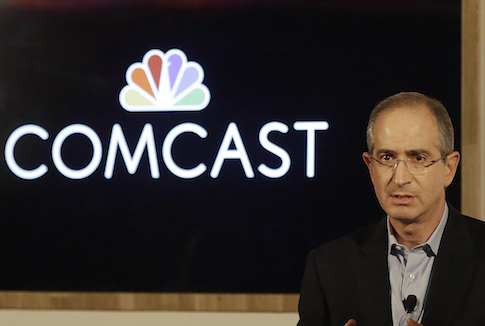As Comcast pursues an acquisition of competitor Time Warner, some conservatives are adopting corporate pressure tactics pioneered by the left designed to punish the cable giant for what they regard as its support for a liberal policy agenda.
Generally averse to targeting businesses over their political affiliations, conservatives are increasingly attempting to exact an economic toll on companies that they see as enablers of their political adversaries and the policies they favor.
A right-leaning super PAC called Conservative War Chest PAC is taking out a five-figure ad buy in five battleground states criticizing Comcast for its ownership of NBC and its liberal cable news arm MSNBC.
"Media giant Comcast-NBC Universal is becoming America’s most powerful and militant leftwing political force," the two-minute ad states, rattling off a list of objectionable coverage and corporate decision making by Comcast’s media arm.
Conservative War Chest spokesman Mike Flynn criticized the proposed merger, which is currently awaiting approval by the Federal Communications Commission, in a statement accompanying the video.
"The last time Comcast needed a government favor we got Al Sharpton five nights a week," Flynn wrote. "What will we get in exchange for a deal worth billions to [chairman and CEO] Brian Roberts and other owners of Comcast?"
Roberts is President Barack Obama’s golfing buddy and a high-dollar donor to his campaigns, and Comcast enjoys a wealth of political connections that observers expect will grease the federal bureaucratic wheels as it seeks approval for the merger.
In his statement, Flynn alleged "potential collusion between Comcast and the Obama Administration" in the former’s pursuit of FCC approval. He called on Republicans "to respond with full mobilization to halt a Comcast/Time-Warner merger."
Efforts to dent Comcast’s bottom line for perceived favoritism to Democrats are part of an emerging trend on the right, according to Chris Walker, the executive director of conservative consumer advocacy group 2nd Vote.
Liberals have created effective corporate pressure campaigns, Walker says, and conservatives waking up to the value of the tactic.
"It’s a tactic they’ve perfected for at least 10, probably even more like 20 years. Company X has to capitulate or else," Walker said in an email.
He cited campaigns against the American Legislative Exchange Council, a free market group that crafts model state-level legislation in consultation with the business community, and Mozilla, a web startup whose former CEO, Brendan Eich, resigned last year after coming under fire for a donation to a 2008 ballot initiative to ban gay marriage in California.
"Conservatives are waking up to the notion that they can’t be engaged only around an election or a specific candidate," Walker said. "There is a lot of policy that is influenced through corporate activity and that’s why an organization like ours is starting to make a difference and gain traction."
2nd Vote scores companies on its website and smartphone app according to their financial contributions to political and policy groups. The goal, according to its website, is "to follow the money and see how the companies you shop with every day are spending the money you spend with them."
The group has not worked directly on the Comcast merger, but it has targeted the company for its perceived liberalism on a range of policies.
Its donations to the Center for American Progress, the Coalition to Stop Gun Violence, and groups that back Common Core education standards and more permissive abortion laws have earned Comcast a 1.4 out of 5 on 2nd Vote’s scorecard.
Walker acknowledges that corporate pressure tactics are traditionally anathema to the right—"conservatives don’t like to ‘boycott,’ I hear that constantly"—but he says recent efforts have already seen some successes.
He cited efforts to reverse Duck Dynasty star Phil Robertson’s suspension from the show after he said he supported traditional marriage, and the reversal of SunTrust Bank’s decision to end its relationship with celebrity real estate moguls David and Jason Bentham over their views on similar issues.
Conservatives’ sense of a general lack of political friendly television content has also fueled skepticism of the Comcast-Time Warner merger.
Influential conservative commentator Glenn Beck, who owns The Blaze, a television network distributed through Dish Network, announced his opposition to the merger in August and encouraged his viewers to submit comments to the FCC on the effort.
The Blaze CEO Chris Balfe told Variety earlier last year that the company was "skeptical that giving Comcast even more market power will benefit consumers, promote competition or lead to more diversity of voices or consumer choice on their channel line ups."
In addition to letter-writing campaigns, conservatives have taken to direct shareholder activism, another tactic traditionally employed by liberal activists, to protest what they see as liberal leanings at Comcast and its lineup of cable news shows.
In 2013, David Ridenouer, the president of the National Center for Public Policy, questioned Roberts during a Comcast shareholders meeting about company policies to ward off libel lawsuits resulting from allegations by its on-air commentators.
Ridenouer and his wife alleged that MSNBC primetime host had inaccurately—and potentially illegally—accused them of violating federal law by bribing politicians.
